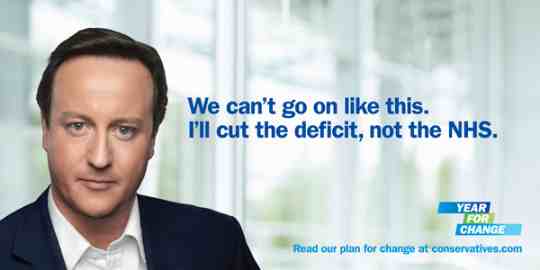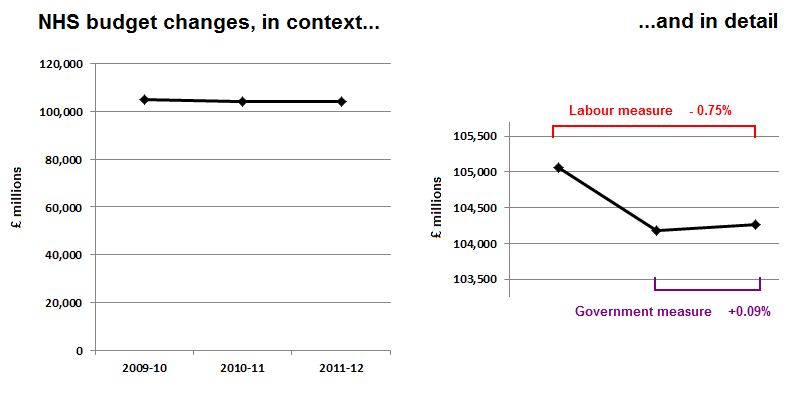Has the NHS budget been cut?

Has the Coalition kept its pledge to ring-fence the NHS budget?
Full Fact first covered this dispute in March 2011 when the head of the Institute for Fiscal Studies (IFS), Paul Johnson, said that so far as the years 2010-11 and 2011-12 were concerned the Government was "meeting its pledge but it is sailing perilously close to the wind."
Earlier this week, Labour seized upon a letter by UK Statistics Authority Chair Andrew Dilnot (in reply to a Labour request) which, they claimed at Prime Minister's Questions and on BBC Question Time, proved that the Coalition had cut NHS spending in real terms. On both occasions the Government rejected this conclusion.
Why? Let's remind ourselves of what Mr Dilnot actually said:
"On the basis of these figures, we would conclude that expenditure on the NHS in real terms was lower in 2011-12 than it was in 2009-10. Given the small size of the changes and the uncertainties associated with them, it might also be fair to say that real terms expenditure had changed little over this period. In light of this, I should be grateful if the Department of Health could clarify the statements made."
A crucial point lost in Labour's re-use of the letter is that Mr Dilnot isn't confirming that the Coalition have cut NHS spending, he is simply stating the difference in funding levels between two different years: 2009/10 and 2010/11. In essence, Labour equate this period to the Coalition's time in office, while the Government claim comparisons should start from 2010/11 onwards.
The 2012 Budget provides the source for some of the figures. In the section on public spending, we'll find a table (2.3) on Total Managed Expenditure (TME) which includes the total sum of Annual Managed Expenditure (AME) and Departmental Expenditure Limits (DEL). To find out exactly what budget the Government will be allocating to various departments we have to focus exclusively on DELs, since AME includes elements of expenditure (such as benefits and social security) that are less predictable, and therefore not subject to multi-year limits and cuts.
Here's what the figures essentially say:

As is apparent from the left-hand graph, from one perspective this entire debate surrounds relatively minor changes made significant only by the fact that one political party chose to promise not to cut NHS spending, and another party chose to hold it strictly to this promise.
So why is this still being debated?
During PMQs this week, David Cameron said the spending figures for 2010/11 were set by the last Labour government, so the Conservatives are not responsible for the real terms cut between 2009/10 and 2010/11:
"We have taken that figure in 2010, we have increased it in 2011 and we will increase it again in every year of this Parliament."
Ed Miliband retorted by saying:
"Labour's plan, which we set out at the election, was to increase the health budget in 2010-11, and he [the PM] cut the budget."
The 2010/11 budget would indeed have been set by the previous Labour government, but it's debatable whether the Coalition could or did have an influence on the budget after entering office early on in the 2010/11 financial year.
In addition, Andrew Dilnot's letter presents two alternative measures of the figures, the first from detailed Public Spending Statistics for July this year, and the second from October this year, which doesn't provide real-terms figures but does provide GDP deflators (which can be used to calculate real-terms changes in budgets).
Interestingly, the July figures show no real terms increases in the budget in any of the last three years - so nothing for the Government to claim in their favour. The only difference between these and the October estimates is the GDP deflator, which causes the most recent year's change to go positive.
Conclusion
From one perspective, we might wonder why the difference of a few million pounds spending in a £100 billion departmental budget should create as significant a debate as we've seen this week.
Moreover, as evidenced by the Dilnot letter, with such small margins involved, a scant monthly change in a GDP deflator can turn a real terms cut into a real terms increase overnight.
Whichever year you choose to take as the starting point, these tight margins need to be borne in mind before drawing conclusions about the direction of NHS funding in the last few years.